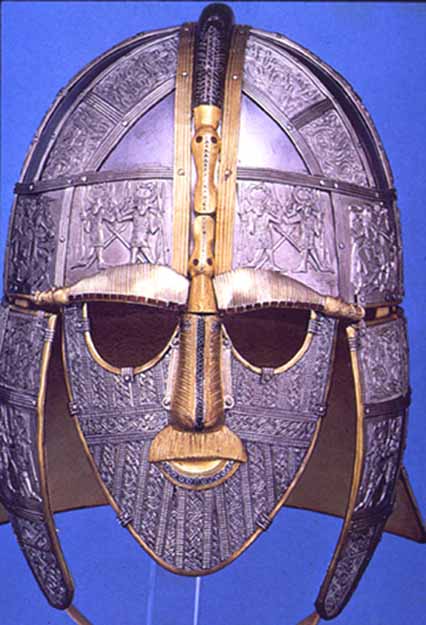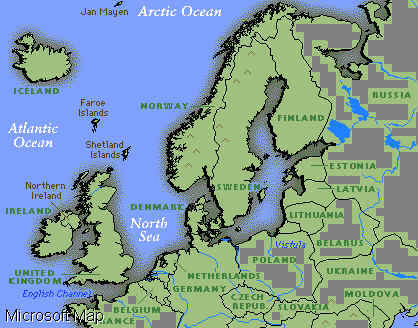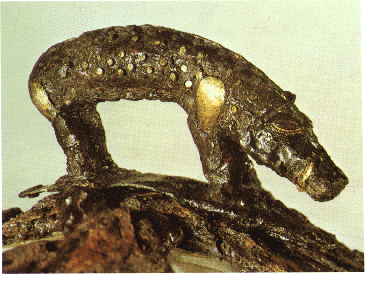
Preparing for Class:
November 1


Beowulf, pp.
2-81
Before you start answering reading
questions about the poem, I'd like you to take a quick look at the manuscript,
which was produced in approximately 1100 AD. The burned edges are proof that
it survived the Great Fire of London in 1731, when the Cotton Library, in which
it had been kept, was in the fire's path. This is the first page, and you should
be able to see some of the Old English words quite clearly and compare them
with your modern translation. Note particularly the word "Hwaet," used by the
scop--or storyteller--to get the attention of the people he wanted to entertain.
Maybe you should try using it yourself sometime: it's a good, explosive sound
and should be projected loudly. OK, here's the manuscript,
page 1.
- Let's start with a reminder that
you need to be familiar with and able to explain the relationship of the following
words and concepts to Beowulf: comitatus; gift giving; wergild; peaceweavers;
Wyrd; immortality; and monsters as forces of nature.
- The poem begins with the founding
of a dynasty: that of Shield Sheafson. Where did Shield come from? What did
he achieve in his lifetime? What made his funeral particularly appropriate
to his life story?
- Describe Heorot, Hrothgar's mead
hall. What will be its final fate?

- What do we know about Grendel?
Why is he so offended by the sounds of human happiness? If Shield is Hrothgar's
ancestor, who is Grendel's, according to the poet?
- After a few nights of Grendel's
raids, what change in sleeping arrangements do Hrothgar's thanes make? How
might this be a violation of their duty to him under the comitatus system?
- On p. 11, we are told, "So Grendel
ruled, in defiance of right . . ." How long does he rule?
- To whom do the Danes pray for
relief from Grendel's raids? What does your author think about that strategy?
- Describe Beowulf (whose name means
bee wolf, a kind of bear). How do he and his 14 men make the trip to Heorot?
How long does the trip take? How is it described?
- Why is Hrothgar's watchman suspicious
of Beowulf and his men when they land? How does Beowulf convince him of their
good intentions?
- You might note, by the way, the
boar-shapes on the Geatish men's helmets, described on pp. 21-3. How does
the description compare to the picture you saw from the finds at Sutton Hoo
on last week's links page?
- The detailed description of the
Geatish armor, shields and spears should give you a good sense of the importance
of these arms to the thane. What does the quality and abundance of these men's
arms tell their Danish hosts?
- Beowulf is met at the door of
Heorot by Wulfgar, Hrothgar's herald (press secretary, in our terms), who
convinces Hrothgar to admit them. The Danes do not fully trust the Geats yet,
however, since Wulfgar makes one requirement of them before they can come
before Hrothgar. What do they have to do?
- On pp. 29-31, Beowulf makes his
first boast, the accepted way of presenting his credentials as hero in this
society. How does he prove he is already a hero? What does he promise to do
in the coming fight with Grendel that also reinforces his heroic stature?
- Who is Weland and why is it good
to have a coat of his forging?
- In response to Beowulf's boast,
Hrothgar inserts his own recollection of Beowulf's father. What story does
he tell and how is it related to Beowulf's offer to help rid Hrothgar of Grendel?
- After the ceremonial boasts, everyone
settles down to some serious drinkig and storytelling, which is rudely interrupted
by Unferth, who "unbound a battle rune" (uttered fighting words). How does
his story of the swimming match with Breca differ from Beowulf's? Are there
similarities? What's Unferth trying to do here?
- Beowulf's response to Unferth
starts with the accusation that too much beer is making Unferth talk too much.
He concludes with another insult to Unferth, on pp. 39-41. What does he say
about his adversary? Unferth will show up again later in the poem, so it's
a good idea to keep this interchange in mind when he does.
- What's the role of Wealhtheow,
Hrothgar's queen, in the mead hall?
- Before going to bed, Beowulf repeats
his boast on p. 43, and again on p. 47; why should this Geat hero sound so
Christian at this point?
- Grendel's attack is described
quite graphically, as he stops to snack on one of Beowulf's men. Why doesn't
Beowulf stop Grendel from killing Handscio?
- As Grendel starts to lose to Beowulf,
he finally "was driven under the fen banks, fatally hurt, to his desolate
lair." How does the poet suggest some sympathy for his suffering?
- What does Beowulf do to signify
the cleansing of Heorot?
- When we left our villain, Grendel,
he had just died and gone to hell (in which, by the way, we're told earlier
neither he nor Beowulf believed). It's a day for rejoicing, and the major
characters do it in typically Old English fashion: they feast and give gifts--in
great detail. First they tell stories. Beowulf himself becomes the subject
of a poem as the local scop "wrought a new lay," "rang word changes" that
"framed rightly the deed of Beowulf." What does this description of the composition
of a new lay, or poem, tell you about the nature and role of poetry in this
culture?
- The next song contrasts Sigemund,
who won his fight with the dragon and becomes a hero, and Heremod, who did
not protect his people and who died in shame. One was a good lord, while the
other failed to live up to the code of the comitatus. How are these two tales
particularly tailored to Beowulf and to the occasion?
- If we know (as the audience in
Heorot would have) that Sigemund's treasure, won from the dragon, was cursed
and finally caused his death, how might that link this section to the poem's
ending? (This, clearly, is a question for those who've already finished the
poem.)
- After Hrothgar and Beowulf exchange
compliments, promises of loyalty and reminiscences of the fight, they get
down to business. Starting on p. 69, we have a list of the gifts bestowed
on Beowulf. You should note what he's given, particularly in terms of the
kind of gifts most prized. Note also that Hrothgar's generosity also extends
to Beowulf's men.
- Since Hrothgar has just told Beowulf
he will always think of him as a son, and they have sworn friendship, it's
appropriate that the scop tells the story of the Danish princess Hildeburh,
wife of Finn the Swedish king. What makes this story a good one now? At the
next celebration, we hear another unhappy story of daughter who's given to
an unfriendly king as a wife. Remember this story when you get to Beowulf's
comments on the effectiveness (or lack thereof) of using daughters as peaceweavers
to cement alliances.

Return to Daily
Readings and Assignments Page
Return to Home
Page




